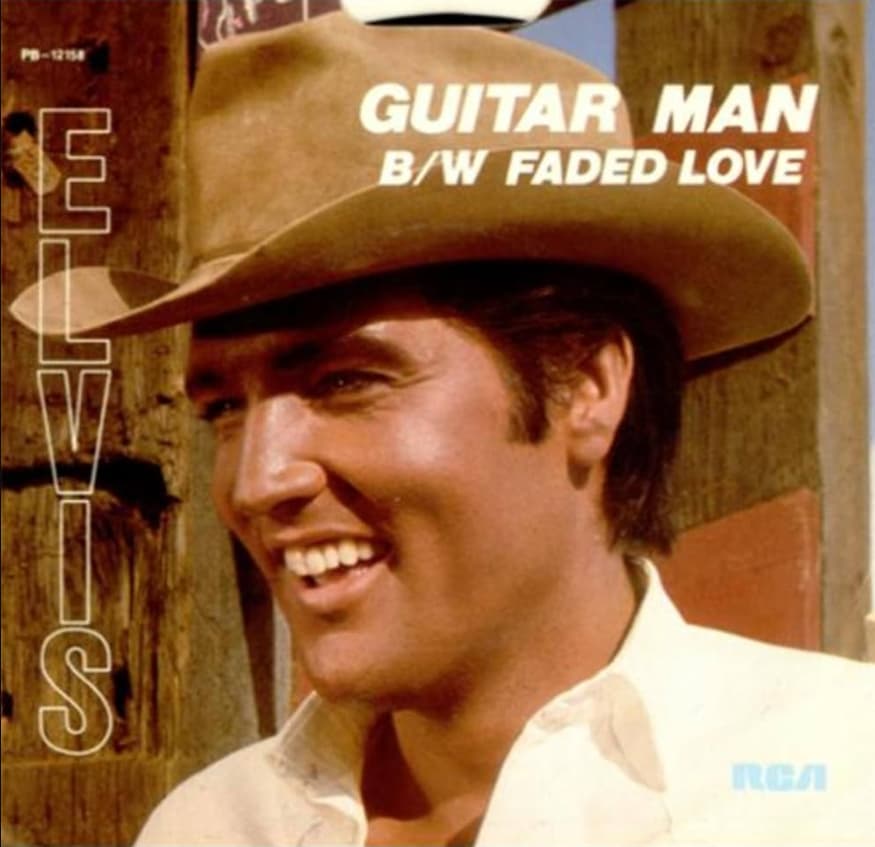
In the fading glow of a long afternoon, a song can feel like a hand reaching back through time, pulling you into a memory you didn’t even know you’d forgotten. For many, that’s the profound power of Elvis Presley‘s “Guitar Man,” a tune that carries with it the gritty authenticity of its Nashville roots and the undeniable magic of the King’s revival. More than just a song, it’s a living artifact of a pivotal moment in music history—a story of a young, struggling picker and the king of rock and roll who found himself in the same, lonely quest for true artistic expression.
The story of a wandering musician’s tireless search for his place in the world.
The journey of “Guitar Man” is one of those legendary studio tales that could only happen in Nashville. The song was originally written and recorded by the brilliant country-funk guitarist Jerry Reed, who released his version in 1967. While Reed’s original recording reached a respectable No. 53 on the Billboard country music charts, it was the sound of his unique, thumb-picked guitar style that captivated Elvis Presley. At the time, Elvis was in a career slump, bogged down by forgettable movie soundtracks and a creative frustration that was becoming increasingly apparent. He loved the raw, untamed feel of Reed’s recording and was determined to replicate it.
But something was off. During the recording sessions at RCA Studio B in Nashville in September 1967, Elvis’s session musicians, masters of their craft as they were, couldn’t capture the funky, “chicken pickin'” sound that was the soul of Jerry Reed’s song. The session grew tense, with take after take falling flat. It was at this moment that Elvis’s producer, Felton Jarvis, made a fateful phone call. He called Jerry Reed himself, who was out fishing, and implored him to come to the studio. Reed, with his signature wit, explained that his style wasn’t something you could simply copy with a straight electric guitar. He showed up, plugged in his own acoustic guitar strung with heavier strings, and with a few masterful, finger-picked licks, he delivered the authentic sound Elvis had been chasing all night. A palpable change came over the studio. The energy shifted, and with Reed on guitar, Elvis finally found the groove. The resulting single, released in January 1968, was pure lightning in a bottle.
The song’s release marked a significant turning point, a harbinger of the comeback to come. While its initial run on the charts was modest, peaking at No. 43 on the Billboard Hot 100, the story was far from over. The song’s true power was in its raw, unfiltered honesty. The lyrics, detailing a musician’s lonely journey from Kingston to Memphis, seeking a place to play, resonated deeply with Elvis. It was an anthem for the road-weary artist, a defiant rejection of polished glamour in favor of authentic struggle. The song found a renewed life and a new purpose as the powerful opening number of his iconic 1968 comeback special. The image of a leather-clad Elvis with a guitar slung over his shoulder, walking onto the stage to the ominous sound of “Trouble” before launching into “Guitar Man,” was a statement: the king of rock and roll was no longer a movie star; he was a musician, a “guitar man” once more. The song’s final vindication would come years later, in 1981, when a posthumous remixed version of the song finally reached the top spot, hitting No. 1 on the Billboard Hot Country Singles chart, a testament to its enduring legacy and the powerful collaboration between two legends. For those of us who remember those times, hearing that riff is an instant transport to a world that was a little less complicated and a whole lot more musical. It’s a bittersweet melody that reminds us that even for a king, the truest path is always the one that leads you back home.